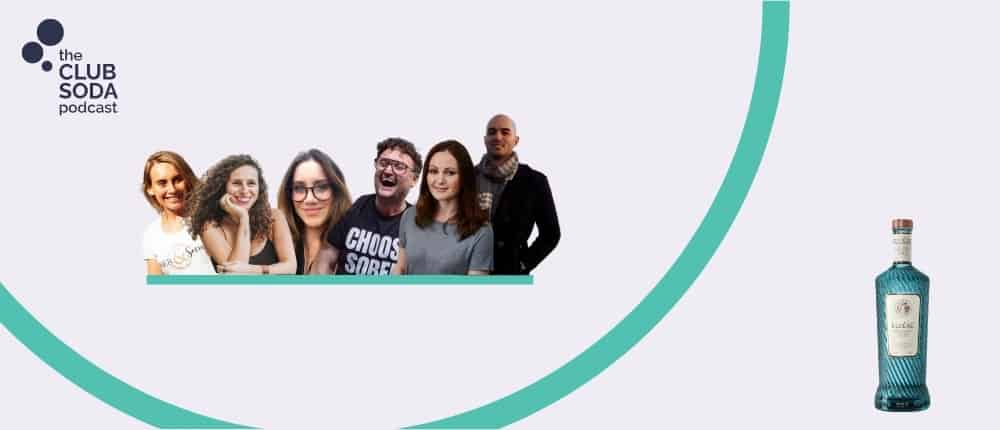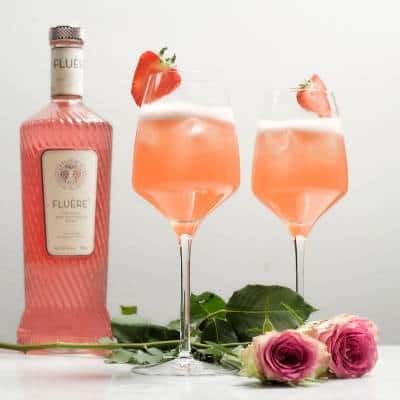This website uses cookies to improve your experience. We'll assume you're ok with this, but you can opt-out if you wish. Read More
The Next Round: What happens after you change your drinking?

Managing our relationships with people when changing our drinking can be surprisingly tricky, whether that’s dating sober or thinking about how we socialise with our friends. It often becomes apparent that alcohol was playing a central role in a lot of our relationships, which can be a daunting realisation. But worry not, because we’ve gathered some great tips from some of the wonderful folk in the sober community. Check out the full episode to discover more about finding confidence in your relationships when you’re changing your drinking. Scroll down for our blog with some of the highlights from this week’s podcast guests. Our thanks to Catherine Gray, Tawny Lara, Lee Mengo, Chase Lee, Emily Syphas, and Kate Bailey.

50 ml FLUÈRE Raspberry
25 ml quality apple juice
15 ml fresh lime juice
2 teaspoons strawberry jam
85 ml soda water
Shake everything except the soda water hard over ice. Strain into a wine glass, there should be a bit of foam, and add ice. Top with soda water, stir gently, and garnish with half a strawberry on the rim.
We were joined by some fantastic guests for our podcast this week. Here are some of the things they had to say about how you can adjust your relationships as you step away from alcohol. Got some suggestions of your own? Feel free to let us know on social media, we’d love to hear about how your relationships have adjusted as you’ve changed your drinking.
Sex gets better the more you communicate. Sobriety definitely teaches us how to communicate and connect with our feelings. You learn more about yourself, you learn what you like, you learn about what turns you on. And sobriety gives you this confidence to stand up for yourself and demand pleasure because you deserve pleasure. If someone is lucky enough to have sex with you, they deserve to hear your words as well. And that includes what turns you on. If you don’t know what turns you on, take some time to explore that too. Sexual partners are not mind readers, they need to know what’s going on. And you’ve got to tell them, so give yourself that time to play and explore.
Tawny Lara – author, speaker, and podcaster
We go through so much of our lives thinking that what we do is normal. Drinking and dating, drinking and sex, drinking and relationships, we think that’s all normal. Start to question those things. Ask yourself if what you’re doing is really the way it has to be done. Try doing things sober with with your partner, or try dating sober. People sometimes think that they can’t do that, and that’s a hugely limiting belief. Challenge those beliefs and take baby steps, and those beliefs will start to slowly dissipate.
Chase Lee – addiction recovery coach
My top tips for dating sober are these. Tell your date beforehand that you don’t drink. This allows you to save time and not end up on a date with someone that leads a completely different lifestyle to yours. Use the opportunity of dating sober and get creative with your dates, especially when the world opens up again after the Covid pandemic. Instead of the pub, why not try table tennis, bowling or rock climbing. And listen to your gut. Now that you don’t have alcohol giving you the beer goggles or false excitement, you can really tune into how you feel about someone and know that it’s real.
Emily Syphas – founder of Sober and Social
I recommend a traffic light system. When we start changing our drinking it can feel quite confusing. There are a lot of uncomfortable emotions around doing something which is not normative. It’s really important we tell the right people and get the right support from people in those early days. We can categorise people in red, amber, and green in terms of what we share with whom. Get onboard with your green people. This can be a sober community, people who are going to reflect your choice back to you positively. Or maybe it’s your nearest and dearest that have your back and want you to do well. It’s very difficult to articulate it sometimes. You could say, ‘I need your love and support, I’m not expecting you to change’. Those are your green people. At the other end of the spectrum, you’ve got the red people. They’re the ones who ask if you’re an alcoholic, or tell you you’re boring, or try to get you to have a drink. People who are not supportive at all. Those are the people that you tell you’re on antibiotics if you don’t feel comfortable sharing your story. There might be a lot of flashing amber people that we’re not quite sure about and that’s absolutely fine. In the very early days, think of those as being in the red camp until you’re feeling more confident.
Kate Bailey – co founder of Love Sober.com
There was definitely a transitional period with my friends. We didn’t really know how to interpret each other anymore. They were just used to me getting absolutely trollied and trying to make them stay out till 3am. I didn’t know how to interact with people without alcohol. I learned to create new rituals with each friend. My friend Gemma and I really like spinning, so we would go to spin class, and then have brunch. My friend Helen likes the theatre. We go for dinner and then go see some immersive theatre. With other friends I’ll have tea and cake and play Monopoly or video games, or we play pool and have fish and chips at the seaside. There’s just so much out there that does not involve drinking. For my first year sober I just limped on and tried to do all the things that I had done before when I was drinking, I tried to not change anything. So I met people in pubs and watched them sink a bottle of wine. I realised that I didn’t find that very interesting. My new rituals with my friends tended to revolve around eating and moving my body. Those are things that I really enjoy.
Catherine Gray – author of ‘The Unexpected Joy of Being Sober’
My bit of advice for not putting alcohol at the centre of any relationship is to change the time of day you do your socialising. Around 90% of my socialising is now done in the daytime, late afternoon, maybe early evening. I don’t do much in the night these days because I’m so active now. This advice comes in two parts; change the time of day, but also change what you do. What really works for me is activities when we’re side by side, so walking, going for a drive, baking, or crazy golf. When you stop drinking or having a break, it can feel quite intense to be sitting across from someone making lots of eye contact. I feel like when we’re doing an activity I feel more relaxed, I can enjoy myself more and usually open up more as well.
Lee Mengo – The Gay Sober
This content is sponsored by Fluère. Find them on Twitter, Instagram and LinkedIn.
This website uses cookies to improve your experience. We'll assume you're ok with this, but you can opt-out if you wish. Read More
| Name | Domain | Purpose | Expiry | Type |
|---|---|---|---|---|
| wpl_user_preference | joinclubsoda.com | WP GDPR Cookie Consent Preferences. | 1 year | HTTP |
| PHPSESSID | www.tickettailor.com | PHP generic session cookie. | 55 years | HTTP |
| AWSALB | www.tickettailor.com | Amazon Web Services Load Balancer cookie. | 7 days | HTTP |
| YSC | youtube.com | YouTube session cookie. | 55 years | HTTP |
| Name | Domain | Purpose | Expiry | Type |
|---|---|---|---|---|
| VISITOR_INFO1_LIVE | youtube.com | YouTube cookie. | 6 months | HTTP |
| Name | Domain | Purpose | Expiry | Type |
|---|---|---|---|---|
| _ga | joinclubsoda.com | Google Universal Analytics long-time unique user tracking identifier. | 2 years | HTTP |
| sbjs_migrations | joinclubsoda.com | Sourcebuster tracking cookie | 55 years | HTTP |
| sbjs_current_add | joinclubsoda.com | Sourcebuster tracking cookie | 55 years | HTTP |
| sbjs_first_add | joinclubsoda.com | Sourcebuster tracking cookie | 55 years | HTTP |
| sbjs_current | joinclubsoda.com | Sourcebuster tracking cookie | 55 years | HTTP |
| sbjs_first | joinclubsoda.com | Sourcebuster tracking cookie | 55 years | HTTP |
| sbjs_udata | joinclubsoda.com | Sourcebuster tracking cookie | 55 years | HTTP |
| sbjs_session | joinclubsoda.com | SourceBuster Tracking session | Session | HTTP |
| Name | Domain | Purpose | Expiry | Type |
|---|---|---|---|---|
| mailchimp_landing_site | joinclubsoda.com | Mailchimp functional cookie | 28 days | HTTP |
| __cf_bm | tickettailor.com | Generic CloudFlare functional cookie. | Session | HTTP |
| NID | google.com | Google unique id for preferences. | 6 months | HTTP |
| Name | Domain | Purpose | Expiry | Type |
|---|---|---|---|---|
| _ga_10XZMT03ZM | joinclubsoda.com | --- | 2 years | --- |
| AWSALBCORS | www.tickettailor.com | --- | 7 days | --- |
| cf_clearance | tickettailor.com | --- | 1 year | --- |
| VISITOR_PRIVACY_METADATA | youtube.com | --- | 6 months | --- |
Join Club Soda for 10% off your first order of drinks for UK delivery. Plus get our latest news and special offers for members to choose better drinks, change your drinking and connect with others.
If you get an error message with this form, you can also sign up at eepurl.com/dl5hPn